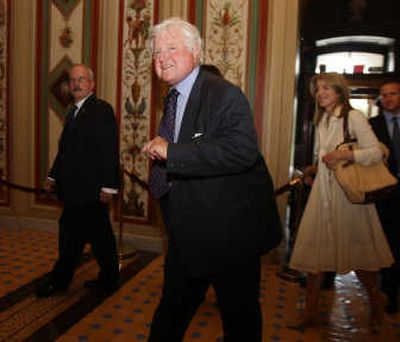Senate approves Medicare safeguard

WASHINGTON – In a floor session highlighted by the appearance of Sen. Edward Kennedy, the critically ill Massachusetts Democrat, the Senate voted Wednesday to stave off a cut in Medicare fees to doctors who treat seniors, military personnel and their families and others.
Kennedy, a longtime champion of the federal Medicare program who underwent surgery for brain cancer in June, appeared halfway through the vote, to tears and thunderous applause from fellow senators and spectators.
Moving carefully but steadily, his face slightly puffy, Kennedy held up both thumbs, flashed a smile and roared his vote: “Aye.”
Democrats credited Kennedy’s appearance with their 69-30 victory in what had been a bitterly partisan dispute. A Senate vote on an identical measure failed by one vote in June.
“We got this victory because of Ted,” said Sen. Max Baucus, D-Mont., chairman of the Senate Finance Committee. “He made this happen.”
The vote, coming on what Democrats had cast as a key election-year test, sets the stage for a showdown with President Bush, who has promised to veto the bill. But Senate leaders sounded confident. The bill passed the House by a veto-proof 355-59.
The only senator to miss the vote was John McCain, who was campaigning in Ohio.
Sen. Barack Obama, the Illinois Democrat and presidential candidate who accompanied Kennedy onto the Senate floor, supported the bill.
The Medicare Improvements for Patients and Providers Act of 2008 would halt a 10.6 percent cut in payments to physicians, scheduled to take effect July 15, and instead institute a 1.1 percent payment increase in 2009. The bill also would improve preventive and mental health benefits.
Bush and many Republicans opposed the bill because the funds to prevent Medicare reimbursement cuts would come from more than $12 billion set aside as payments to private insurance companies that offer Medicare Advantage.
The American Medical Association estimates that without the legislative fix, 60 percent of U.S. doctors would be forced to limit the number of new Medicare patients they treat.
Kennedy, 76, flew to Washington after his daily cancer treatment and returned to Massachusetts immediately after the vote.
“I return to the Senate today to keep a promise to our senior citizens – and that’s to protect Medicare,” Kennedy said later in a statement. “Win, lose or draw, I wanted to be here. I wasn’t going to take the chance that my vote could make the difference.”